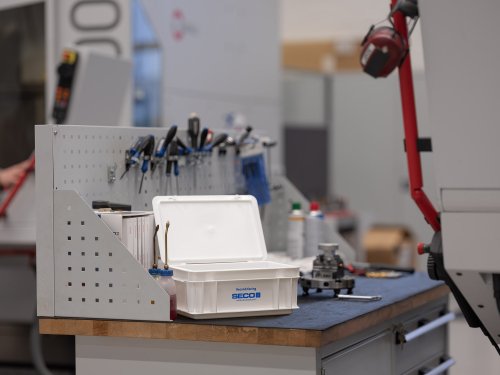
As one of the fastest growing end mill and drill areas in the Seco Tools portfolio, the company’s solid-round tool reconditioning service experienced an increase in use by over 30% in 2022.

In addition to significant cost savings for customers, a Seco reconditioned tool regains 85% to 95% of its original performance compared to tools that are reground or resharpened. Without having to readjust parameters or sacrifice performance, the reconditioned tool performance lives up to today’s advanced machining strategies, for example, in dynamic milling where only a small portion of a tool’s diameter is engaged in the cut. Manufacturers also boost their sustainability and help reduce emissions per part as well as those needed to produce new solid round tools from virgin raw materials.
Reconditioning versus regrinding
The regrinding process sharpens a tool’s cutting edges. Seco reconditioning, on the other hand, brings round tools back to a level close to their original condition in terms of properties and performance. This level of quality is guaranteed by Seco, and today’s shops demand this assurance, especially when considering process stability for automated and unmanned operations.
Benefits of the Seco process
The same process used for new tool manufacturing is applied when Seco reconditions a tool. This includes all relevant grinding steps on the same type of machine with the same programs, wheel types as well as the reapplication of coatings that were applied when the tool was produced new. Seco identifies the tool and its reconditioning program that matches all original/as-new specifications and applies all the necessary micro and geometrical properties.
Plus, Seco reconditioning can be applied to the same tool typically two or three times to significantly extend its working life. Each of these reconditioning cycles, according to Ruud Zanders, Global Reconditioning Lead at Seco Tools, are also done at a cost level of half to one-third of the price of a new tool. “The savings,” he said, “are represented in a simple way by the equation 1+3=2 (one new tool cost plus three reconditions equates to the price of two new tools).”
Reconditioning contributes to a circular economy
Contributing to the circular economy’s three basic principles (waste and pollution elimination, products and materials circulation, and nature regeneration), the reconditioning program by Seco Tools helps shops maximize the lifecycle of round tools, keeps products in use longer and reduces the impact on the environment. Tools can be reused through reconditioning then finally be recycled.
“This content is provided by the company and the website will not be responsible in any way for the content of this article.”
